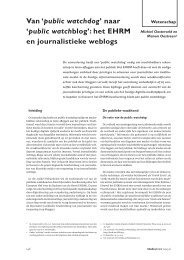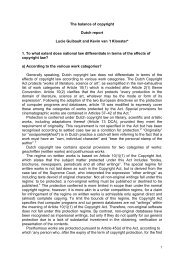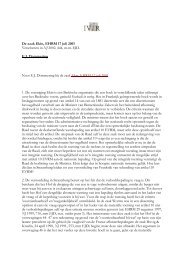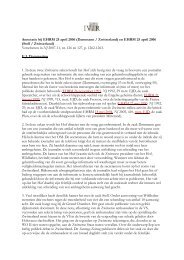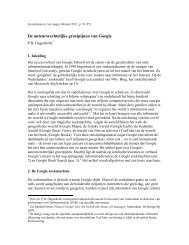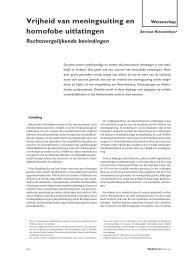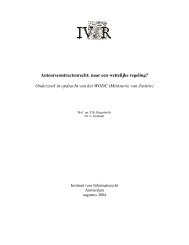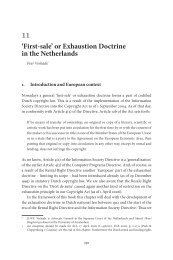ADAPTING COPYRIGHT TO THE INFORMATION ... - IViR
ADAPTING COPYRIGHT TO THE INFORMATION ... - IViR
ADAPTING COPYRIGHT TO THE INFORMATION ... - IViR
You also want an ePaper? Increase the reach of your titles
YUMPU automatically turns print PDFs into web optimized ePapers that Google loves.
present copyright system does not protect each genre equally; in most European<br />
countries, e.g., a computer program is better protected than, say, a novel 5 . Moreover, in<br />
many countries the rightholder's exploitation rights are defined in platform or genre<br />
specific terms: right of printing, right of broadcasting, right of cable distribution, etc.<br />
Convergence of roles<br />
As the Internet experience clearly demonstrates, traditional actors in the communications<br />
process (information producer, provider, publisher, intermediary and user) will take on<br />
new roles in the digital networked environment. The Internet is structured as an `open<br />
platform model', as opposed to the `broadcasting model' of most existing mass media. On<br />
the Internet authors may freely disseminate their works without the intervention of<br />
traditional publishers: authors are becoming `publishers'. Moreover, digital technology<br />
enables users to actively search and manipulate information available on the network:<br />
users are becoming authors. Furthermore, traditional intermediaries, such as university<br />
libraries, may take on new roles as information providers: intermediaries are becoming<br />
publishers as well. This convergence of roles may eventually affect the existing system<br />
of rights allocation in copyright and neighbouring rights legislation.<br />
1.3 Communicating on the superhighway: a change of paradigms?<br />
The digital networked environment of the superhighway represents a change of<br />
paradigms for the traditional copyright industries. Mass circulation of copies carrying<br />
identical information products is replaced by transmission of customized information on<br />
demand. In this process, the `public sphere' between information provider and<br />
information user is gradually dissolving. 6 The act of `publishing' thereby loses much of<br />
its original connotation. The increasingly `private' nature of information distribution on<br />
the superhighway is amplified by the increasing use of encryption techniques.<br />
Information on demand<br />
The superhighway infrastructure enables users to actively communicate with information<br />
providers: interactivity. Users can retrieve information of their choice from information<br />
banks at innumerable points on the network. Conversely, publishers and other<br />
information providers will `customize' information to accommodate specific user<br />
demands, employing detailed `user profiles' drawn up from previous usage patterns. In<br />
this process of interactive and customized information usage, the information product<br />
will gradually lose its `concrete' form of expression. Instead, the product will merely<br />
serve as a source file for an infinite variety of derivative information products on<br />
demand.<br />
Interactivity and customization combined will make existing (or future) legal distinctions<br />
between `stand-alone' and collective works (such as audiovisual works and databases)<br />
difficult to maintain. On the superhighway, the collective work will rarely be consumed<br />
5 Pursuant to the European Software Directive, supra note 3, most copyright exemptions that apply to<br />
ordinary `writings', e.g. for private copying, are not valid in respect of computer programs.<br />
6 Th. Dreier, `Copyright digitized: philosophical impacts and practical implications for information<br />
exchange in digital networks', paper presented at WIPO Worldwide Symposium on the Impact of<br />
Digital Technology on Copyright and Neighbouring Rights, Harvard University, 31 March - 2 April<br />
1993, p. 11-14.




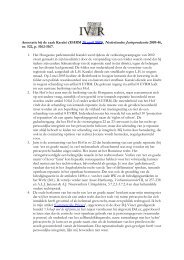
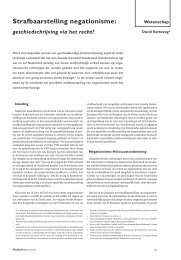
![Legal Opinion of Professor Egbert Dommering [1] concerning ... - IViR](https://img.yumpu.com/23603085/1/184x260/legal-opinion-of-professor-egbert-dommering-1-concerning-ivir.jpg?quality=85)
